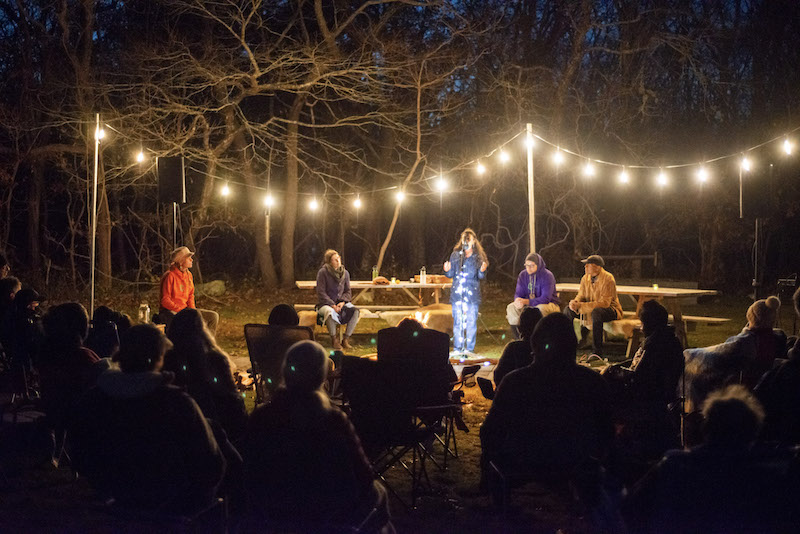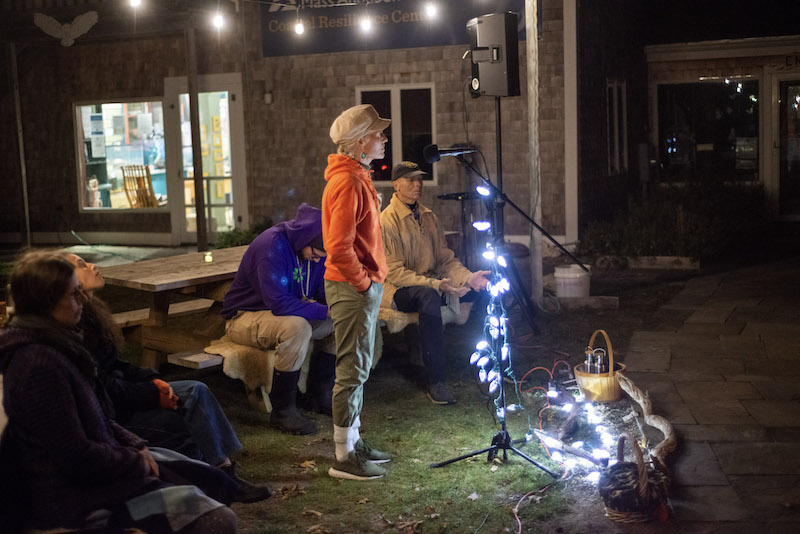With Thanksgiving on the minds of many, members of the Wampanoag tribe spoke on a chilly Thursday evening to reflect on what to them is not a festive holiday, but rather a reminder of a dark, traumatic event — the true meaning of which has been sanitized by the historical record.
Titled An Ungrateful Taking, the talk took place at Felix Neck Wildlife Sanctuary and was hosted by Sassafras Earth Education co-founders David and Saskia Vanderhoop. Mr. Vanderhoop started by offering a litany of things he is thankful for, then speakers shared their thoughts about the history between native people and the United States.
Aquinnah tribal ranger Michael Sellitti opened by reminding the group of about 30 people that all of Massachusetts and much of the Northeast was Wampanoag territory.
“We acknowledge those ancestors and all of their ways . . . their wisdom and intuition when it came to being stewards of this land,” Mr. Sellitti said. “We acknowledge that this wisdom that they had was passed for many generations and that seeds of that wisdom exist within us today.”
Mr. Vanderhoop said Thanksgiving is a day of grief for native people.

“Now that’s not to take away from any celebration that you all have in your house, where it’s a wonderful thing to gather with family and friends,” he said. “But what I am saying is that for me, as a Wampanoag man . . . it is not a day of thanksgiving. It’s a day of mourning . . . that reminds us about what has been taken from us.”
The first gathering, 400 years ago in 1621, was a minor event, Mr. Vanderhoop said. The Pilgrims were celebrating a successful harvest, he continued, which happened because native people showed them how to cultivate the land, and shot off their rifles in revelry. Thinking the gunfire signaled trouble, an army of Wampanoags showed up to honor a mutual-defense pact with the Pilgrims. There is scant evidence of a celebration between the two groups, he said.
What’s more important are the subsequent early gatherings, which were parties to celebrate the genocidal conquest of native people and their land, Mr. Vanderhoop continued.
“There are numerous accounts of these celebrations where white people played soccer with native peoples’ heads,” he said.
Thanksgiving did not become a national holiday until 1863, when Abraham Lincoln declared it as a way to bring together a nation fractured by the Civil War, and the story of docile natives breaking bread with paternalistic Pilgrims was born, Mr. Vanderhoop said.
“The action of this lie carries over from that time in the 1800s right up to today, as this white colonized system is still driving native people into debt, stealing their land through so-called legal practices, and keeping us impoverished on our own land,” he said.
Native people rank at the top of “every single negative list,” Mr. Vanderhoop said, from drug abuse to alcoholism to suicide. “That is only part of the harm that still continues today.”
Alexis Moreis, of the Chappaquiddick Wampanoags, gave a more Island-centric account of native land dispossession and its continuing impacts.
“The Chappaquiddick Wampanoag tribe we had . . . 800 acres allotted to reservations,” Ms. Moreis said. “Today the Chappaquiddick Wampanoag nation owns zero.”
Wampanoag voices should be centered in Island conservation projects because they know the land, Ms. Moreis continued. Efforts to bring affordable housing to the Island must also consider Wampanoag people, she said, as the ones who have left have done so by necessity.
“We’re benefiting from 12,000 years of Wampanoag people living and taking care of this place,” Ms. Moreis said. “There needs to always be a priority of making sure that the Wampanoag people are able to stay here, [live] here, and provide sustenance for their families.”
Audrey van der Krogt, who is not of native descent, offered an apology to the Wampanoag people.
“For the lack of truth and history taught in the schools . . . for there still being Columbus Day on the Martha’s Vineyard school calendar. For the [United States] government not offering their condolences and acknowledging this country’s history, I offer my condolences,” Ms. van der Krogt said.
Recognizing the truth is the first step towards reconciliation, Mr. Vanderhoop said.
“It just uplifts me so much to see you here, to be able to listen to some history, and to be able to talk about it and maybe do something about it,” he said. “Bring this to your table. Truth talk. That’s what you can do.”








Comments (10)
Comments
Comment policy »